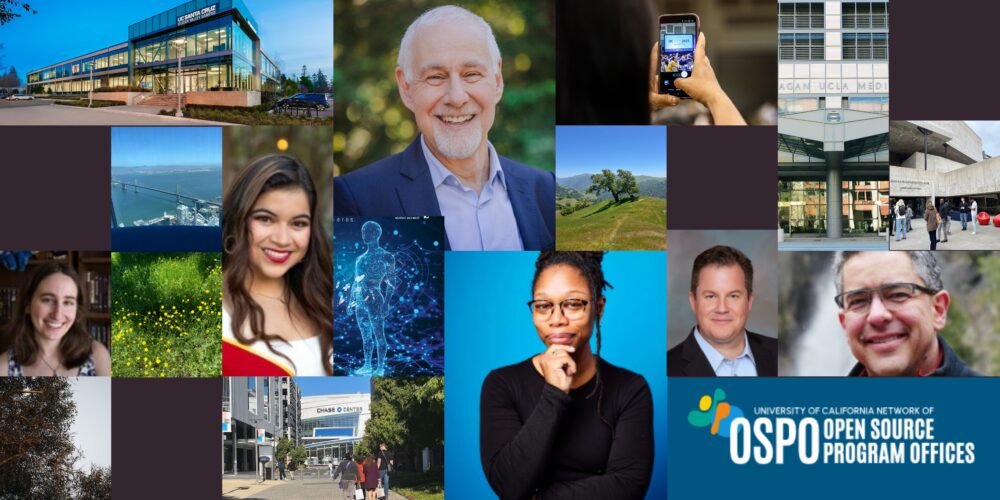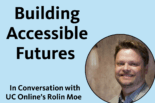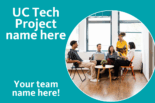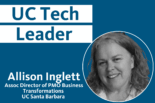By UC Tech News, featuring Becky Grady, PhD, Product Manager, DMP Tool, UC3 [UC3 is a creative partnership bringing together the expertise and resources of the CDL, the ten UC campuses, and the broader international curation community.]
The University of California hosted its first open source summit this spring—UC Open 2025, led by the UC Open Source Program Office (UC OSPO) at the UC Santa Cruz Silicon Valley Campus. The event gathered developers, researchers, funders, and industry partners to explore how open source can thrive within and beyond the UC system.
For Becky Grady, PhD, who manages the Data Management Plan (DMP) Tool at the California Digital Library, the experience was both eye-opening and energizing. Coming from a background in UX research and product management, and relatively new to open source, she reflected on the challenges and opportunities she discovered.
Challenges in Open Source
Grady manages the DMP Tool, an open source platform that helps researchers create data management plans. Before this role, she primarily worked with proprietary tools and hadn’t engaged deeply with the open source ecosystem. UC Open highlighted just how much there is to learn—about licensing, governance, and sustaining software over time.
1. Misconceptions about profitability undermine maintenance
“There’s a belief you can’t make money from open source,” Grady explained. “But I learned about successful business models built around support services, quality assurance, and premium features. In science, funding tends to prioritize new innovations over long-term maintenance. Without planning for sustainability, essential tools can fall away—wasting resources and harming research.”
2. Academic incentives don’t reward contributions
“Researchers don’t get much credit for contributing to open source,” Grady noted. “They’re rewarded for publications, citations, and new grants. That focus on novelty discourages community contributions—even though many tools are critical for research.”
She emphasized that indispensable tools often rely on volunteer support that receives little recognition: “They may not be flashy, but they underpin much of modern research.”
3. Community doesn’t build itself
As Marissa Strong observed, “A lot of our repositories are open source, but we don’t have contributing guidelines. Many are licensed under MIT, but some haven’t been updated since 2020.”
One of Grady’s takeaways is to strengthen contribution guidelines for the DMP Tool. She added: “Many don’t even know we do open source at UC Office of the President. Events like this help bring people together, connect with industry and funder partners, and build the kind of community that makes these tools sustainable.”
What the UC Open Source Program Office (OSPO) Can Do
Still in its early stages, the UC OSPO is well-positioned to:
- Connect developers across campuses
- Facilitate partnerships with industry and funders
- Support the long-term sustainability of open tools
- Raise awareness of open source practices and opportunities
Grady was encouraged by the Chan Zuckerberg Initiative (CZI) sponsorship of the event. CZI has supported aspects of the DMP Tool through a UC3 grant and has expressed interest in maintaining both new and mature software that underpins research.
Looking Ahead
Grady and her team are rebuilding the DMP Tool to make it more machine-actionable. She envisions a future where data management plans are structured, interoperable, and connected to broader knowledge networks—not just static documents.
“Open source is key to making that vision a reality,” she said.
UC Open reminded her that she and her team are not alone. Across the UC system, developers, researchers, and product managers share a commitment to open science and open infrastructure. With support from the OSPO and events like UC Open, UC has the opportunity to build something lasting—together.
About Becky Grady
Becky Grady, PhD, is the Product Manager for the DMP Tool at UC3. Not a developer herself, she works closely with engineers and brings experience as a technical product manager for back-end systems in the tech industry. She earned her doctorate in Psychological Science from UC Irvine, where she studied misinformation and memory, and is committed to research transparency and reproducibility.
Join Tech X
Interested in continuing the conversation? Join Tech X, a regular forum for the UC Open Source Program Office (UC OSPO) community to share insights through Lightning Talks (2–5 minutes) and short CDL staff presentations (15–20 minutes).
👉 Sign up for a Tech X Lightning Talk or Presentation
Open to all UC staff members.
Learn More
- Explore the UC OSPO Website
- Browse UC Open April 2025 Event Resources
Contact

Sr. Product Manager
UC Office of the President
Author
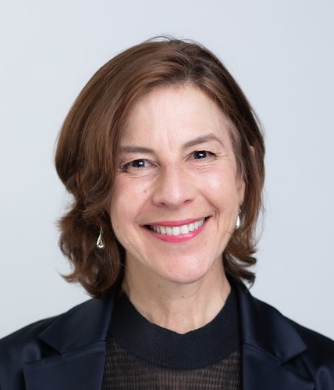
Marketing and Communications
UC Office of the President

